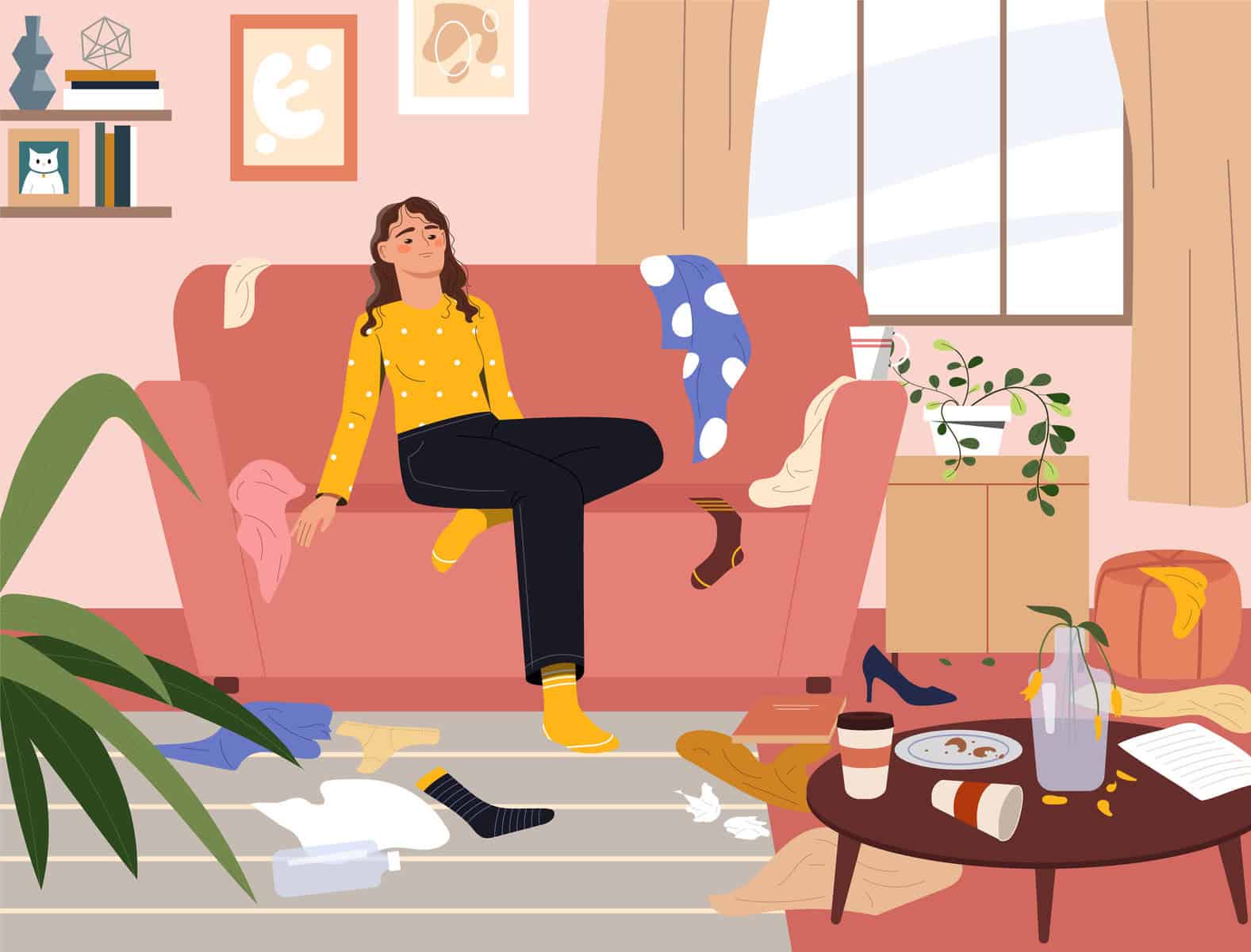
If you dream of getting organized but picture it as an unachievable goal, I am here to tell you it is possible to get organized even if you struggle with chronic disorganization. How do you know if you are chronically disorganized? The Institute for Challenging Disorganization assigns these three defining features to chronic disorganization:
- Persists over a long period of time
- Frequently undermines quality of life
- Recurs despite repeated self-help attempts
(from https://challengingdisorganization.org)
As a professional organizer certified in chronic disorganization, I specialize in working with people for whom getting organized is a struggle. I often hear clients say I have tried so many times to get this room, this closet, this house organized and have never been successful. I am always sorry to hear that because I know just how stressful and discouraging it is when you work hard to do something and have either limited or no results. The problem is that many people view getting organized as a destination.
If you think to yourself that you can work hard to get organized and then be done, you are going to be disappointed.
Organized is a state of being. It is always a work in progress. There is no such thing as getting organized and never organizing again. I know these words are harsh and are not want you want to hear but, please read on because help is at hand.
Find a professional organizer trained in chronic disorganization.
The key ingredient here is to find a qualified professional (such as myself) who will work with you to create personalized strategies. Organizing is not a one-size fits all process. It’s important to organize your home the way that appeals to you and works with the way you think. Search the directory on the Institute for Challenging Disorganization website to find a qualified professional organizer in your area.
We have strategies to help you figure out where to put your belongings so you can find them again. This will improve your quality of life. You will save money because you won’t have to buy something you KNOW you already have but can’t find.
A professional organizer with an understanding of chronic disorganization will guide you to create routines and cultivate better habits. This provides you with the structure to make a daily schedule for yourself so that you arrive at appointments on time or early. Doing this helps you maintain good relationships with your family, friends, and co-workers.
While you are looking for a professional organizer with whom to work here are some tips to help you get motivated to make some changes on your own.
3 tips to motivate you.
1. Start small.
Take 5 minutes and toss the trash. Set the timer on your phone and spend 5 minutes walking around your home picking up trash and tossing it. You will be amazed by how much you can do (toss) in just 5 minutes.
Do this every day until the only trash you have is in the garbage can.
This serves two purposes. First, you will have no trash to pick up. Second, it helps to create the habit of putting the trash in the garbage can.
If trash starts to accumulate again, repeat the process of picking up trash every day for 5 minutes.
Clearing the trash may help motivate you to do more.
Try not to berate yourself for not putting trash in the garbage can to begin with. When you struggle with chronic disorganization, the default is to beat yourself up. Change the channel away from the negative refrain and give yourself props for picking up the trash today.
2. Sort through piles one pile at a time.
Ask yourself these questions as you sort through each pile:
Where do you use this?
Is there space near where you use it to keep it? Note: you can store things in plain sight if putting things out of sight makes you forget about them.
If you do not use an item, is it something to keep or could someone else benefit from it?
Separate things according to their category.
If it is a document, determine if it is something to keep, shred, or recycle. Keep vital documents in a safe place like a locked fire box in your home or a safe deposit box at the bank. You can also keep a scanned copy in a secure cloud account.
Do you have magazines mixed in the piles? Decide how long you want to keep them? Could you read the magazine online?
Are there clothes here, there, and everywhere? Ask yourself if it is because it’s hard to put them away. There is always another way to keep things. A professional organizer will have suggestions for you based on your preferences.
Maybe it is something you left out in plain sight as a trigger to do an errand – to return it to the store, exchange it for something else, or to get it fixed. Instead, get out your calendar and schedule time with yourself to do this errand.
3. Be mindful of your actions.
When you put something down ask yourself if this is that item’s home. If it is not, can you put it where it belongs right now?
Create a habit of assigning specific times to things you tell yourself you want to do. Say to yourself that you will do xxx after breakfast or after you take a walk. Make an effort not to use the word ‘later’.
If you are doing something and you get distracted, ask yourself “is this the best use of my time right now?” Try to finish one task completely before moving on to something else that may be more fun.
As a certified professional organizer in chronic disorganization, I know this is a very real struggle. One of the best things you can do for yourself is to change how you speak to yourself. Always give yourself a pat on the back for picking up or putting something back. Give yourself grace. Acknowledge what you didn’t do and move on. Find a professional organizer (like me) who will support you either in-person or virtually. I’d be honored to speak with you and review your options.
Diane N. Quintana is a Certified Professional Organizer® ,a Certified Professional Organizer in Chronic Disorganization®, Master Trainer and owner of DNQ Solutions, LLC and co-owner of Release●Repurpose●Reorganize, LLC based in Atlanta, Georgia.


I love the gentle and compassionate approach that you take. I think if most people with chronic disorganization could just read a post like yours, it would help dissipate so much of the shame and anxiety related to the situation, clearing the way for true, actionable work to take place.
Too often, people can imagine that they are beyond help, or that just any random person (neighbor? mother-in-law) can help, and then they find themselves back in the same place. Your advice and tone-setting is essential to real improvement. And that third step of adding mindfulness? There’s so much crossover between ADD/ADHD and chronic disorganization, and slowing down to be mindful is a dramatic (and little-used) strategy. Thank you for writing this!
Great manageable tips. Start small and just keep going. And you’re so right that maintenance is key. You can’t just do it once and be organized forever!
Another great blog! I especially like working on becoming more mindful. I have a mindfulness bell app on my phone that will randomly ring 7 times a day. When I hear it, I relax my body, get a drink of water, and ask if I am doing the best thing I can right now.
“Organize is a state of being!” I love that! People forget that being organized is a state of mind. We must continue to keep systems in order, modify other ones, or even eliminate them to simplify processes.
I agree that starting small is there prefect place to start. People don’t realize how much they can do in 5 minutes, let alone 15 minutes daily. Overtime, you can do a lot.
Thank goodness for the Institute of Challenging Disorganization. Not only have they educated and trained professional organizers in all things related to chronic disorganization, but they have a lot of information to access on their website, which is useful to everyone.
Knowing you are not alone in your organizing challenges is valuable. And finding the right type of support, as you mentioned, makes all the difference. As you said, organizing is not a one-size-fits-all process. And it’s also not a destination but a way of living. After spaces are cleared, ‘homes’ for things are created, and the excess is edited, it requires ongoing maintenance to keep a space clear. Having that expectation at the start is helpful.
I really love those last two suggestions: to assign a specific time for a task, and to ask if a task is the best us of my time. I can often get engaged on projects and tasks that feel productive on some level, but honestly are not the best use of my time. Sometimes this is okay, because I’m “off duty” and just want to relax. But other times, I know that I am working on what is easy as a form of procrastination. Wonderful post!